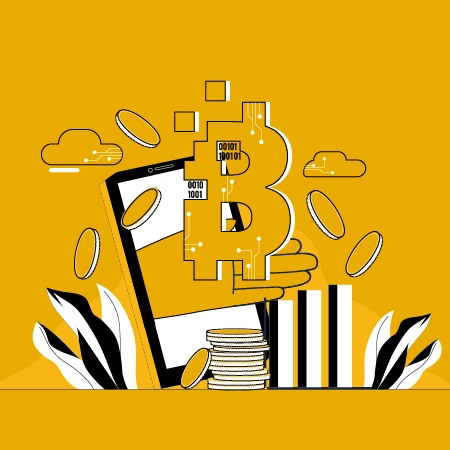- What is Blockchain?
- The Impact of Blockchain Beyond Cryptocurrency
- The Four Foundation Pillars of Blockchain Technology
- ICO
- Smart Contracts
- Cryptocurrency Wallets
- Blockchain NFTs
- Applications and Use Cases of Blockchain in Various Industries
- Blockchain in Healthcare
- Blockchain in FinTech
- Blockchain in Real Estate
- Blockchain in Manufacturing
- Role of Blockchain in Modern Startups and Enterprises
- Blockchain in Enterprises:
- Blockchain in Startups:
- Blockchain Solutions for Your Digital Business
- Blockchain in business transactions
- Blockchain in mobile business apps
- App Approval Process
- Blockchain security solutions
- How Much would Blockchain App Development Cost?
- Factors Affecting Blockchain App Development Cost are
- How Appinventiv can Help Your Business with Blockchain?
The Blockchain Market will be worth 163 billion USD by the time we reach 2027. The time has come when the digital world has realized the power of decentralization and incorporated it into their everyday process. The technology, which has set off, can indeed be too much to understand and implement for a business.
But does it mean you, as an entrepreneur, should let go of the glorious opportunities that come with investing in Blockchain? Well, not until we are here.
We have curated a handbook for you – a Blockchain beginners guide – to answer the most frequent questions like what Blockchain technology is, its applications and uses, and the benefits it carries to bring mass revolution in the world.
Also Read: 10 ways blockchain is leading business transformation across different industry verticals
The only prominent solution that one can think of to avoid any confusion on Blockchain is by looking at the many pieces of information presented on the world wide web and getting the hang of the technology. To answer one of the fundamental questions:
What is Blockchain?
Blockchain is a distributed database shared among several nodes of a system. It is called Blockchain since it collects information in blocks that are encrypted and linked to other sets of blocks, forming a digital chain.
The Blockchain concept has predated its widespread application via the creation of various cryptocurrencies, dApp monetization Smart Contracts, Defi (Decentralized Finance) applications, and NFTs (Non-Fungible Tokens).
Here’s the guide that will clarify the complicated Blockchain development world: A Beginners Guide to Blockchain.
The Impact of Blockchain Beyond Cryptocurrency
As we keep exploring this technology, we realize Blockchain is not restricted to popular cryptocurrencies and asset tokenization. There is much more to the technology than the digital currency that keeps reaching new numeric value every passing hour, larger than what it was an hour ago.
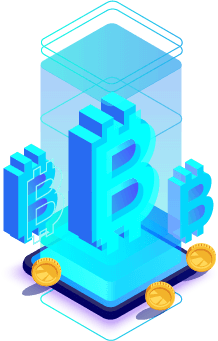
Although the mass popularity of Blockchain has been limited to its contribution in the field of Bitcoin or other cryptocurrencies, there are several use cases now emerging at a steady rate. This is a sign of the potential that the decentralization technology comes with and proves an unignorable impact of Blockchain on business across industries.
Today, Blockchain, along with its several features like – Smart Contracts, ICOs, etc., are coming in handy for several different purposes, which are usually attended by businesses in their everyday processes. These inherent Blockchain features have made it a part of several industries like – FinTech, Real Estate, Agriculture, Healthcare, Education, Manufacturing, Retail, and On-demand.
The different domains or use cases of Blockchain that go beyond Cryptocurrencies have been well explained in the write-up titled Blockchain Beyond Cryptocurrencies.
The Four Foundation Pillars of Blockchain Technology
Now that we know that Blockchain is a broader phenomenon beyond transaction and crypto, let’s check out what technologies act as a base for Blockchain to fuel technological development.
ICO
Initial Coin Offering is a fundraising model chosen by startups and enterprises that have a Blockchain element in their business model. Here is how it works;
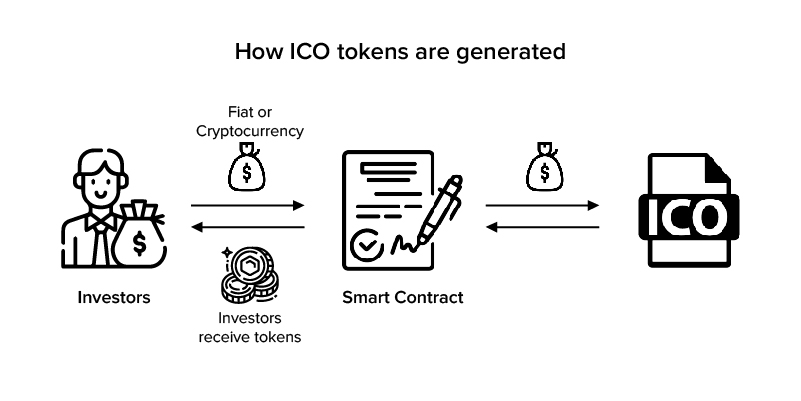
Pre-Announcement- The first stage of ICO is when the preparation of the ICO is made. At this stage, the white paper – containing the details of the project – is drafted, and the marketing campaigns are started on websites that the ICO investors frequent.
Offering- It includes the contract’s terms and conditions that are drafted and passed over to the prospective investors.
The financial instrument – cryptocoin, which has a toe assigned with it, is offered to investors in return for their capital.
Marketing Campaign-This is the stage where the actual legwork happens. The campaign generally tends to stay up to around a month and targets an audience belonging to small investors and institutions. The demand is a lot higher than the otherwise popular fundraising mode – Venture Capitalism, giving birth to queries like VC vs. ICO: Know who is winning.
Smart Contracts
Next to ICOs, the technology that has found its prominence in the world of businesses powered by Blockchain is Smart Contracts.
When you make Smart Contracts on Blockchain, you can serve the same purpose as their physical world Contracts counterparts; there is no way for any involved parties to breach the contract.
In the case of Smart Contracts on Blockchain, both parties are made to put in an amount individually in a separate escrow amount that is in neither of their controls and is only released when the terms and conditions of the contract are fulfilled. The design of Smart Contracts promises many vital things such as accuracy, zero disputes, high transactional speed, data storage, embedded trust, etc.
Cryptocurrency Wallets
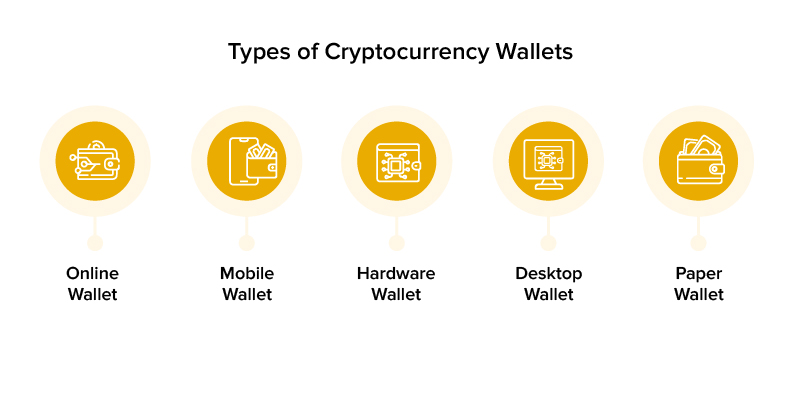
The next Blockchain element that we will look at is something that the decentralization industry started with – Cryptocurrency wallets apps. The state that Bitcoin has created for itself has given birth to over 1,600 and still counting cryptocurrencies floating in the world, with a number of others being launched almost on a daily basis.
You get several options, even on the development front, regardless of what purpose you are willing to solve with your cryptocurrency wallet. Options like- desktop wallet, mobile wallet, online web wallet, hot/cold wallet, hardware wallet, paper wallet, etc.
You can learn more about Cryptocurrency Wallets here.
Blockchain NFTs
NFTs are relatively new to the Blockchain family and by far the most popular means of investment in 2022. What is so special about NFTs? Well, for starters, they are non-fungible. For example, Bitcoin is fungible, which means you can trade one for another bitcoin, and the value remains the same. But NFTs can not be exchanged.
At a fundamental level, NFTs can be anything digital such as music, drawing, picture, etc. ) that is unique to you. This is probably why they are trending on every social platform since everyone wants to own digital assets.
NFTs are part of Ethereum-based assets powered by smart contracts on the Ethereum Blockchain. If this interests you in your startup or enterprise business, you must check out the development cost of the NFT marketplace.
Also Read: Unleashing the Potential of Blockchain in Digital Identity Verification and Management
Applications and Use Cases of Blockchain in Various Industries
Blockchain as a service has infinite applications and uses for various industry niches.
Let us now look at the top industries that have embraced decentralization in their regular process.
Blockchain in Healthcare
Although there have been many rounds around the real impact of Blockchain in the Healthcare industry and if the impact is even real or simply a wishful thought, the truth that we are standing on today is that Blockchain is revolutionizing the Healthcare industry and is prepared to solve a number of challenges that prevent efficient health and care support to the world.
The places where Healthcare lacks are the ones that Blockchain fills with decentralization. Blockchain helps in:
Timely Access of Data- The distributed ledger that comes as a package with Blockchain and Healthcare mix enables distributed and secure access to the patient’s health data. The updates made to the patient’s shared data are also done in real-time.
System Interoperability- Blockchain offers a decentralized computer network and internet across boundaries.
[Also Read: Blockchain Interoperability: The Key to Connect Siloed Blockchain Networks]
Data Security- Being completely decentralized and immutable, the patient data is only accessible to those who need to interact with it.
Blockchain Healthcare makes it possible to consolidate users generated IoT data with their healthcare organization data in one place.
Blockchain in FinTech
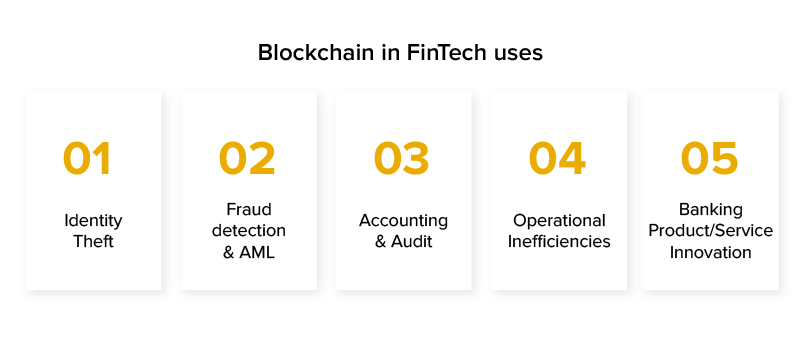
FinTech and Blockchain are the combinations with which the technology entered the world. While Blockchain is bound to bring digital transformation in the Banking industry per se in terms of a much more efficient KYC process, faster transactions, minimal to zero hacks, and lowered transactional costs, the technology will have an impact on all the other financial domains as well.
For instance, check out how Asian Bank took Appinventiv’s help to embrace the Blockchain crypto-centric banking solution through its app.
The other financial services that will start showing signs of streamlining and faster, more trustworthy processes are – Client Identification System, Digital Payments, Insurance, Loans, and Credits.
Related Article: Blockchain in Trade Finance: Revolutionizing Global Commerce
Blockchain in Real Estate
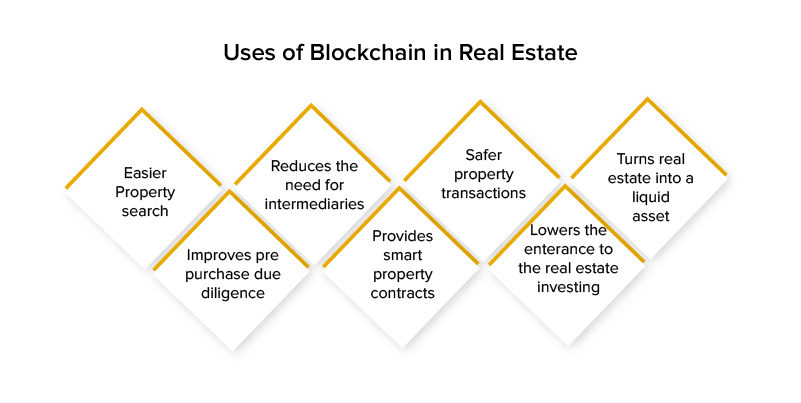
Real estate is pretty much the one sure shot industry that has floated a proper use case of Blockchain Real Estate technology. The very definition of the industry consists of processes that can be decentralized and streamlined through Blockchain for Real Estate.
If you look at the present scenario of the Blockchain in Real Estate adoption, you will find that it is not just the individual property developers, real estate agents, and insurance companies who are using Blockchain and decentralization but also the government of several nations who are working towards a more efficient real estate scenario in the country.
Seeing the acceptance that the technology has received from the Real Estate world, it is safe to say that it is the Property Market from where maximum use cases would emerge very soon.
Blockchain in Manufacturing
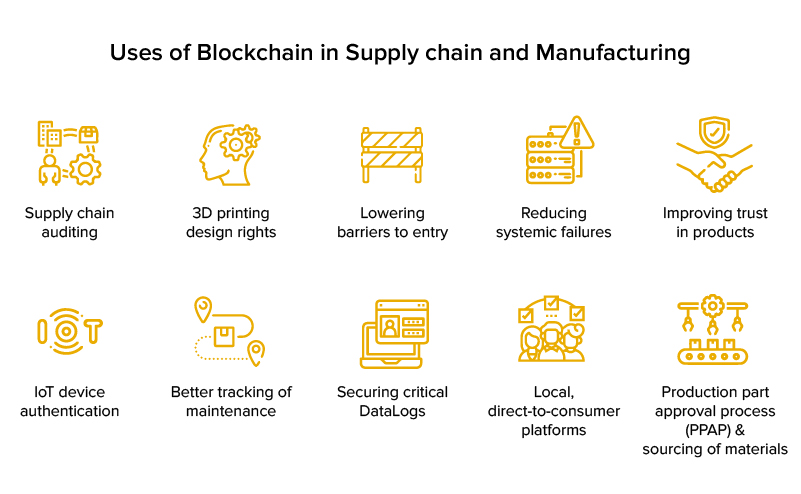
No matter what tech trend you look at, you will see the presence of the Internet of Things in it. The two epitomes of technology – Blockchain and IIoT (Industrial IoT) are now blended to work together to save the supply chain and manufacturing businesses from manual labor.
If IoT devices are directly connected with Blockchain technology, it will help keep track of the history of all the connected devices for any troubleshooting purposes in manufacturing and operations.
In the supply chain, the distributed decentralized ledger can eliminate a single source failure in the IoT ecosystem protecting all the machinery data from collusion and tampering. IoT and Blockchain can also provide consensus and agreement models in smart contracts to avoid getting threats.
Blockchain technology is revolutionizing the energy sector by acting as a secure, scalable and transparent ecosystem for energy transactions. Check out our blog on How Is Blockchain Disrupting The Energy Sector to understand its impact in detail.
[Also Read: The Rise of Blockchain in Digital Marketing – Benefits, Use Cases and Challenges]
Role of Blockchain in Modern Startups and Enterprises
While the scale of enterprises who have adopted Blockchain for business is still more tilted towards those who haven’t, the Blockchain enterprises use cases developed by those who have added the technology in their process is too efficient and profitable to ignore.
Blockchain in Enterprises:
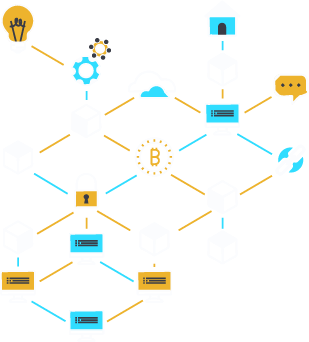
One reason behind the difficulty of incorporating any technology is identified as the inclusion of legacy systems that have brought a business really far. But, the time has now come for Enterprises to shed the doubts while being safe and incorporate Enterprise Blockchain Solutions in a portion of their process and only scale when they confirm that the technology is working for them.
Using the different platforms – Ethereum, Hyperledger Fabric, R3 Corda, Ripple, and Quorum, you can even join the list of enterprises that have incorporated and are now benefitting from the decentralized technology. There has been a monumental shift in the enterprise blockchain development and you must be aware of the enterprise blockchain real use cases to know, understand, and introduce it to your enterprise
Blockchain in Startups:

Startups, unlike Enterprises, have no legacy system challenges that might extend the timeframe of when they incorporate what Blockchain for Startups entails in the everyday process.
So, if you are a startup, you are at an advantage in terms of emerging as an industry disruptor by adding the technology that solves almost every problem that cripples a business from offering real value to its customers and internal stakeholders alike.
With its different components, Blockchain for Startups can not just help create a wall around all the processes that a startup has to attend to on a more regular basis than an established entity, like the creation of the contract between different stakeholders and the management of a decentralized team.
When we talk about the inclusion of Blockchain technology in a startup ecosystem, there is rarely any process untouched by decentralization. This event is a blessing for startups looking to establish themselves as innovators in the market and even for those looking to raise funds.
Also Read: Exploring the Business Benefits of Permissioned Blockchains: Efficiency, Security, and Collaboration
Blockchain Solutions for Your Digital Business
Blockchain technology has introduced the most transformative era in the business where investors, innovators, and forward-thinking enterprises embrace Blockchain solutions to bring trust and transparency. From international transactions to mobile application development, let’s find what Blockchain solution you can leverage best for your business.
Blockchain in business transactions
No matter what industry you look at, transactions will be at the center of the core business process.
And, like its omnipresence, the challenges associated with transactions are also the same across industries – Lack of Security, Lack of Transparency, and Lack of Decentralization – All the issues that have a standard solution known as Blockchain.
Here are the different ways Blockchain for Transactions can have an impact no matter which industry is under the microscope –
Increased Transparency and Security of Data
Blockchains are virtual distributed ledgers, free from all these shortcomings. Transactions are encrypted, immutable, and stored in an orderly fashion. They are accessible to all nodes but cannot be altered.
Elimination of Intermediaries
Third-party intermediaries do not mediate blockchain transactions, and they are verified by miners who work round-the-clock in solving mathematical puzzles. The transaction is verified and added to the distributed ledger as soon as these computations are done.
Efficiency in Settlements
In Blockchain technology, settlements are done instantly, perhaps its biggest advantage. As there are no intermediaries and all verification is logic-based, human involvement is minimal, processing delays.
Blockchain in mobile business apps
Although the industry – Blockchain App Development is evolving and getting disrupted in so many ways with the addition of new technologies and use cases, the industry is, however, still lagging in several other ways like high advertising cost, lack of uniform in-app purchases methods, and app approval process.
Let us throw some light on how Blockchain technology works in applications to solve these persistent mobile app industry issues.
App Approval Process
The inclusion of Blockchain in app development brings both – approval guidelines and applications – on a public ledger that is open for others to review as well, thus ending the monopoly created by Play Store and App Store.
In-App Purchase
In the case of in-app purchases, the app store first charges an amount for enabling in-app purchases from their platform, and then the debit/credit purchase that users make charges them in the name of transaction fees, processing, and several other extra costs.
All these cuts that happen in the amount of in-app purchases that a user makes usually amount to over 30% – something that can easily be avoided by no transaction fees cryptocurrency payments.
High Advertisement Cost
By making the advertisement platforms decentralized, one can remove the middlemen from the picture and bring down the transaction cost by making the whole process more transparent. These are simply a few examples of how Blockchain can be integrated into the mobile app industry to streamline it further. Know the entire thing here – See Effect of Blockchain on Mobile App Industry In-Depth.
Blockchain security solutions
With its power coming in from decentralization, encryption, and immutability, Blockchain Security can safeguard a number of business processes and make them tamper-proof. Blockchain and Security unison will impact and play a massive role in safeguarding – Data Protection, Data Transparency, IP protection, Infrastructure Safeguarding, Password-free economy.
This is simply an outlook into the many ways Blockchain can help secure your business; if you wish to know how Blockchain can secure your mobile app business, head on here – Know How Blockchain Secures Your App and Business.
And after everything is said and done, it ultimately comes down to how much it will cost you to incorporate the Blockchain technology that can mark you as an industry disruptor. All startups and enterprises most commonly avail Blockchain development services from a reliable development company, and their team of experts can help tap your business into a decentralized ecosystem.
Let us look at the following final chapter of our guide today – How Much Does it Cost to Build a Blockchain App.
How Much would Blockchain App Development Cost?
Like the mobile application development cost, the cost it takes to make a Blockchain app also depends on the app goals, the set of features, and the efforts you put into the complete development process.
Factors Affecting Blockchain App Development Cost are
Blockchain App Category
- Cryptocurrency Based Solution
- Non-Cryptocurrency Based Solutions
Blockchain App Services
- Crypto-Wallet
- A Distributed Decentralized Leger that can eliminate a single source failure in the IoT ecosystem protecting all the devices’ data from collusion and tampering
- Smart Contract Development
- ICO
- Distributed Ledger Technology
- Crypto-Exchange
So, here are the factors that impact Blockchain App Development Costs. Now, as promised, let us take you to the numeric values – Know the Blockchain App Development Cost Estimate.
The cost factor also depends on the type of Blockchain service you leverage.
How Appinventiv can Help Your Business with Blockchain?
Appinventiv serves a wide range of decentralized solutions to add security and scalability to the system. From Blockchain app consultation smart contract development to Crypto token development, we can guide you through a convenient service. Our Blockchain experts follow through with a wide range of experience.
From combining the power of Crypto a hotel industry through an app called Empire to developing a Blockchain powered LMS “Nova” that transformed the education sector, we deliver all. Connect with us to know more.


Excellence Together

How to Create a Social Media App in 2024? A Comprehensive Guide
In today’s digital landscape, you will hardly find a person who is not on social media platforms. Social media applications have completely changed our ways of communication. YouTube, Facebook, Instagram, LinkedIn, Twitter, TikTok. The list goes on and on. These social networking sites have the power to redefine the media, culture, education, politics, and business.

Cloud Computing - An Ultimate Guide for Businesses
The global cloud computing marketplace is expected to reach US $1251.09 billion by 2028. Having emerged somewhere around the turn of the 21st century, the cloud computing marketplace has formalized into unique service and deployment models helping millions of businesses (and customers) inadvertently. Were it not for cloud computing technology, we might still be bereft…





